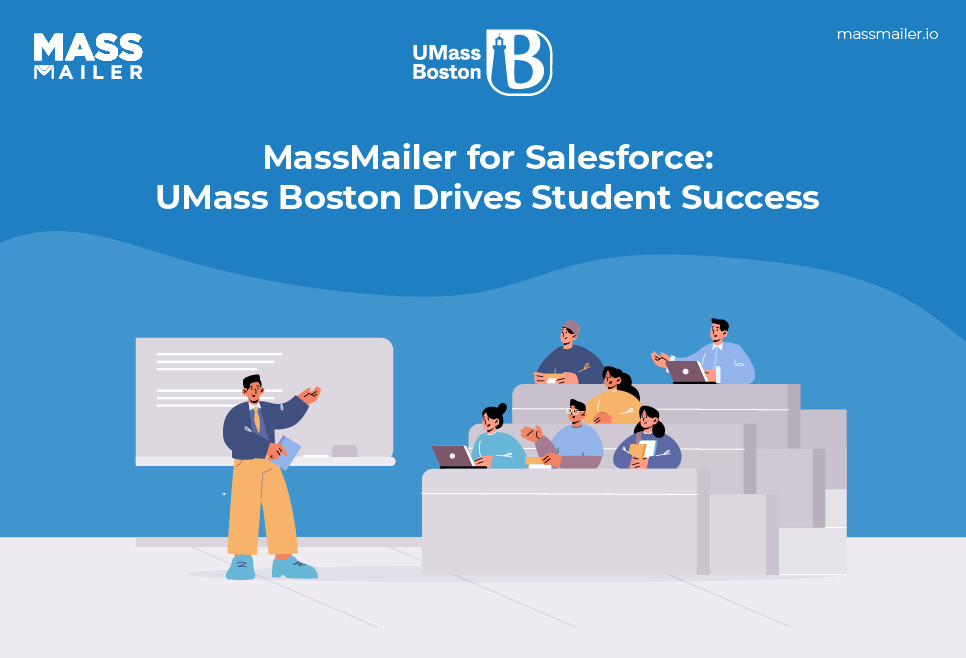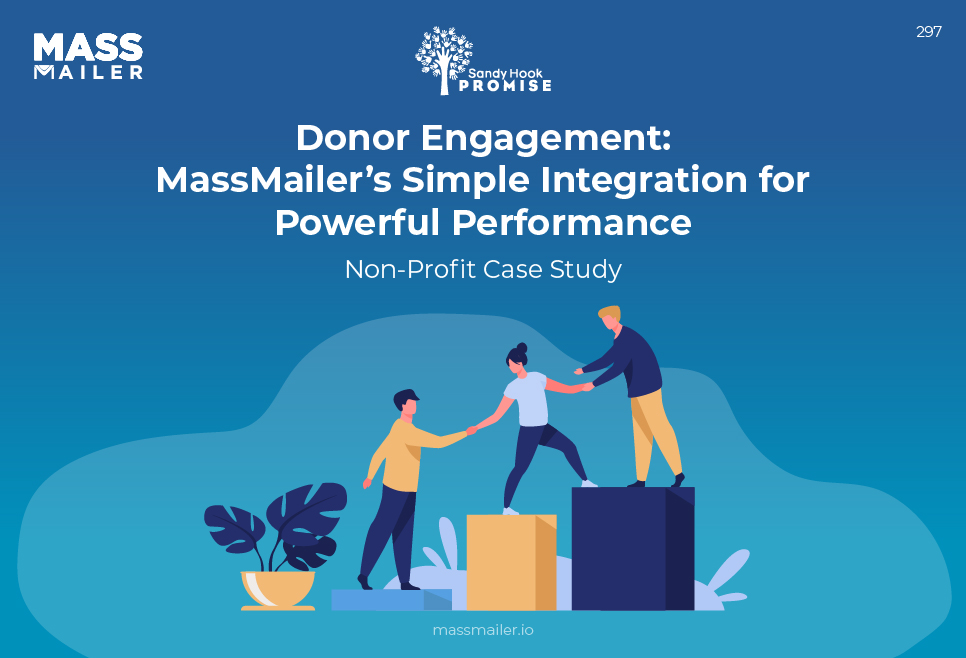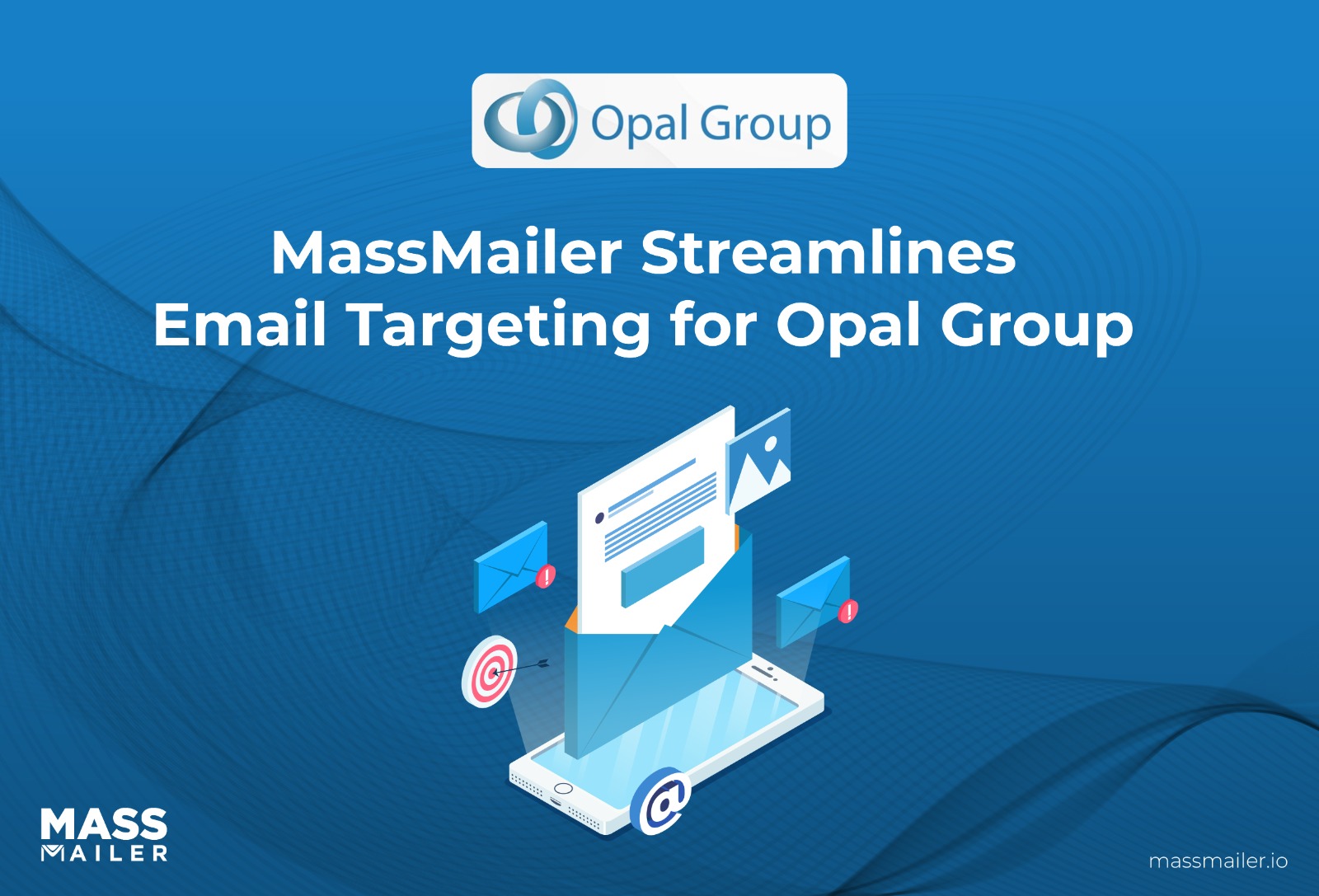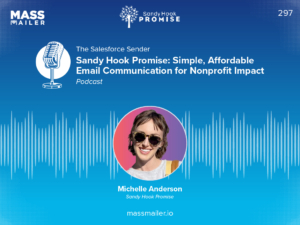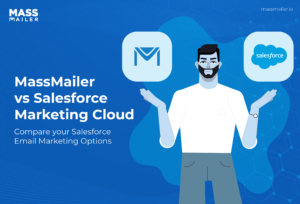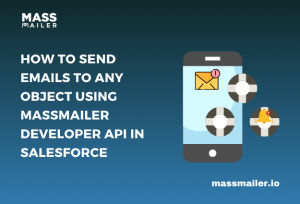Table of Contents
Introduction
Salesforce, with over 150,000 companies using its platform daily, is ranked as the world’s number one CRM by an IDC study. Whether businesses use it for sales, marketing, service, or as a comprehensive solution by integrating, Sales, Marketing, and Service Cloud, Salesforce has become the singular source of truth for many organizations, transforming the way they engage with customers.
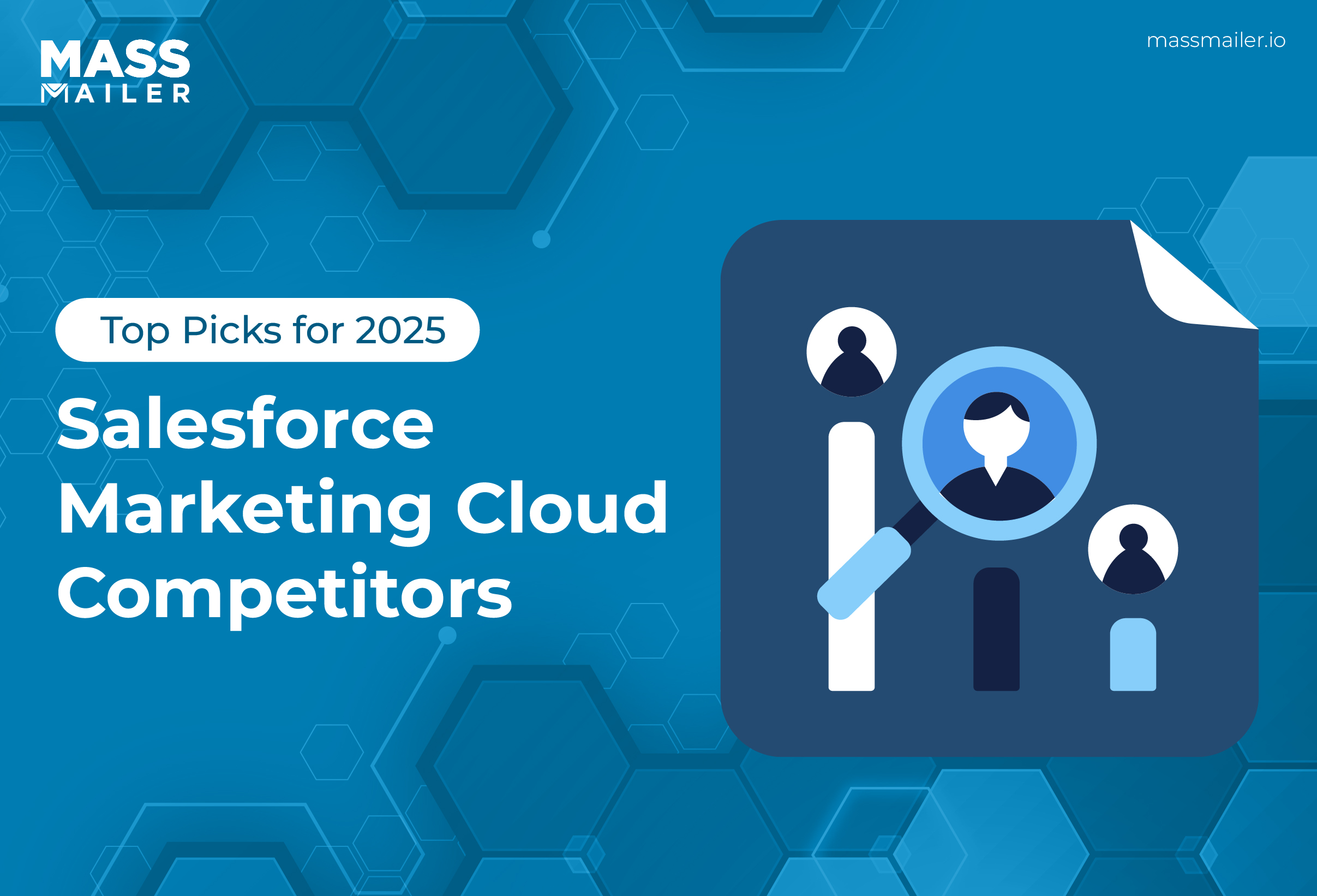
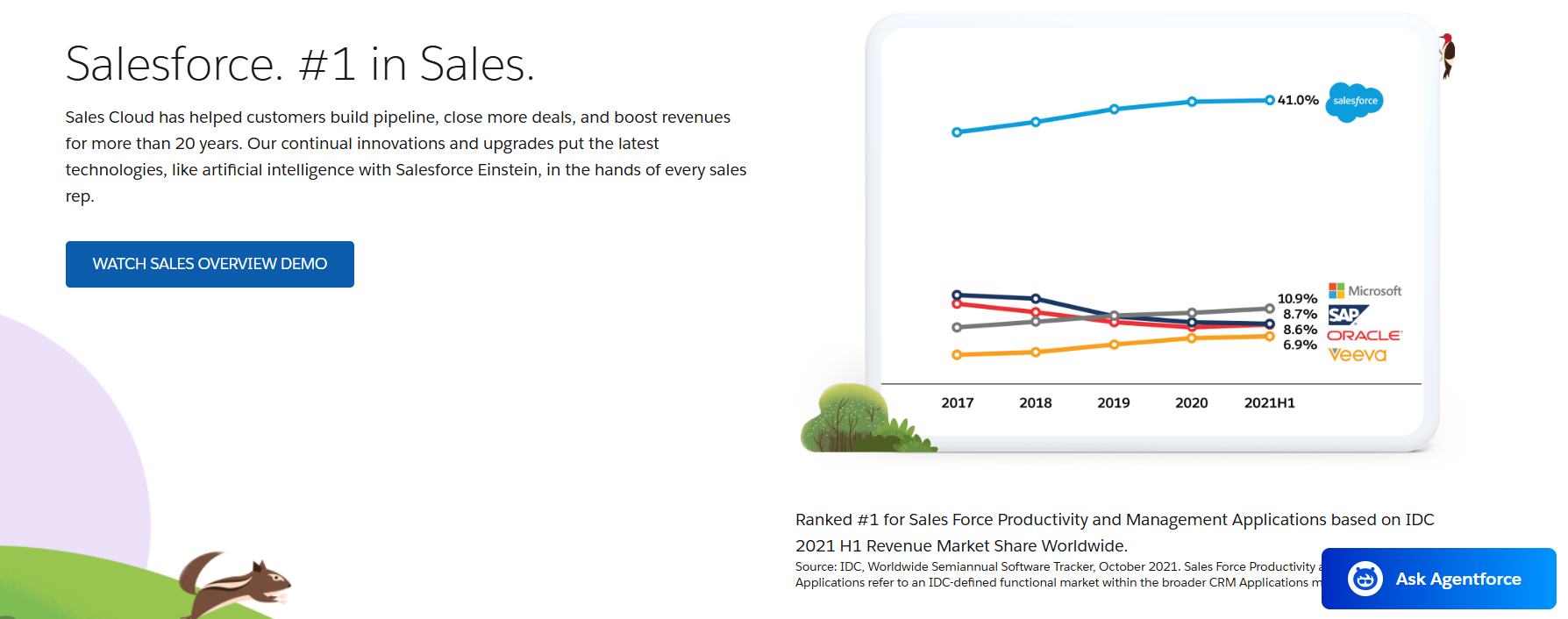
Salesforce's extensive suite of tools offers unparalleled capabilities. But it doesn't come without its challenges. For all its shiny features, there are limitations that businesses must contend with, especially when it comes to pricing, complexity, and scalability.
In this blog, we will cover everything you need to know about Salesforce Marketing Cloud like what it is, the advantages it offers, its limitations, and its competitors. We’ll also dive into the top alternatives available, helping you make an informed decision about whether Salesforce Marketing Cloud is the right fit for your business.
Major Salesforce Marketing Cloud Competitors
As businesses search for solutions that address Salesforce Marketing Cloud’s limitations, a variety of competitors stand out in 2025. Below are some of the top alternatives:
Massmailer
MassMailer is a native Salesforce application designed to enhance email marketing capabilities within the Salesforce CRM ecosystem. It addresses the limitations of Salesforce's native email features, enabling users to send mass emails, automate campaigns, and manage email deliverability directly from within Salesforce.
This integration ensures a seamless experience for Salesforce users, eliminating the need for external email marketing platforms.
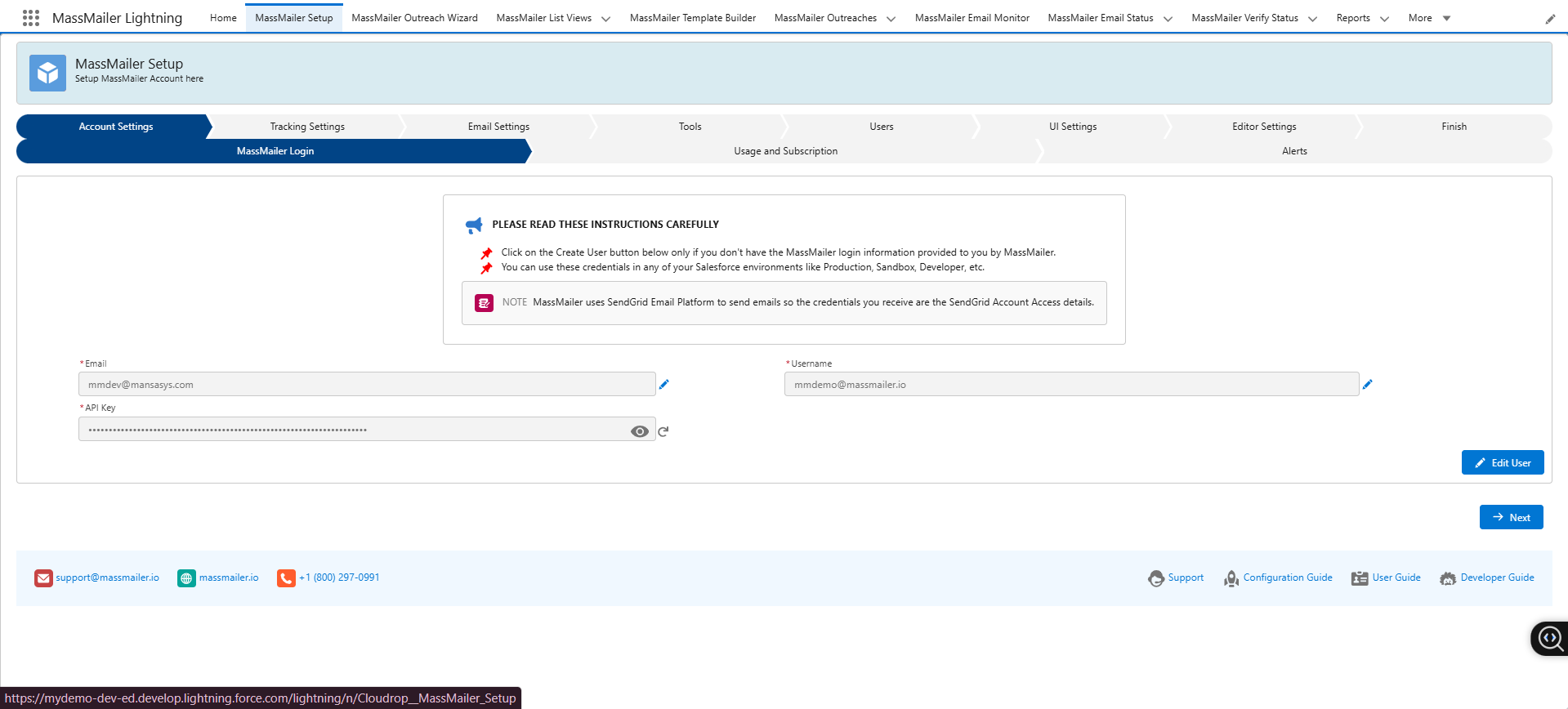
The platform has several features and is perfect for companies of every size. Some of the other highlights of MassMailer that help simplify email marketing include:
- Sending bulk emails
- Creating varied email templates
- Consolidating various leads and contacts within Salesforce
- Real-time monitoring
- Generating in-depth analytical reports
- Better email deliverability
Key Features
- Unlimited Email Sending: Bypasses Salesforce's daily email limits, allowing users to send an unlimited number of emails to standard and custom objects within Salesforce.
- Email Verification: Verifies email addresses, reducing bounce rates and protecting sender reputation.
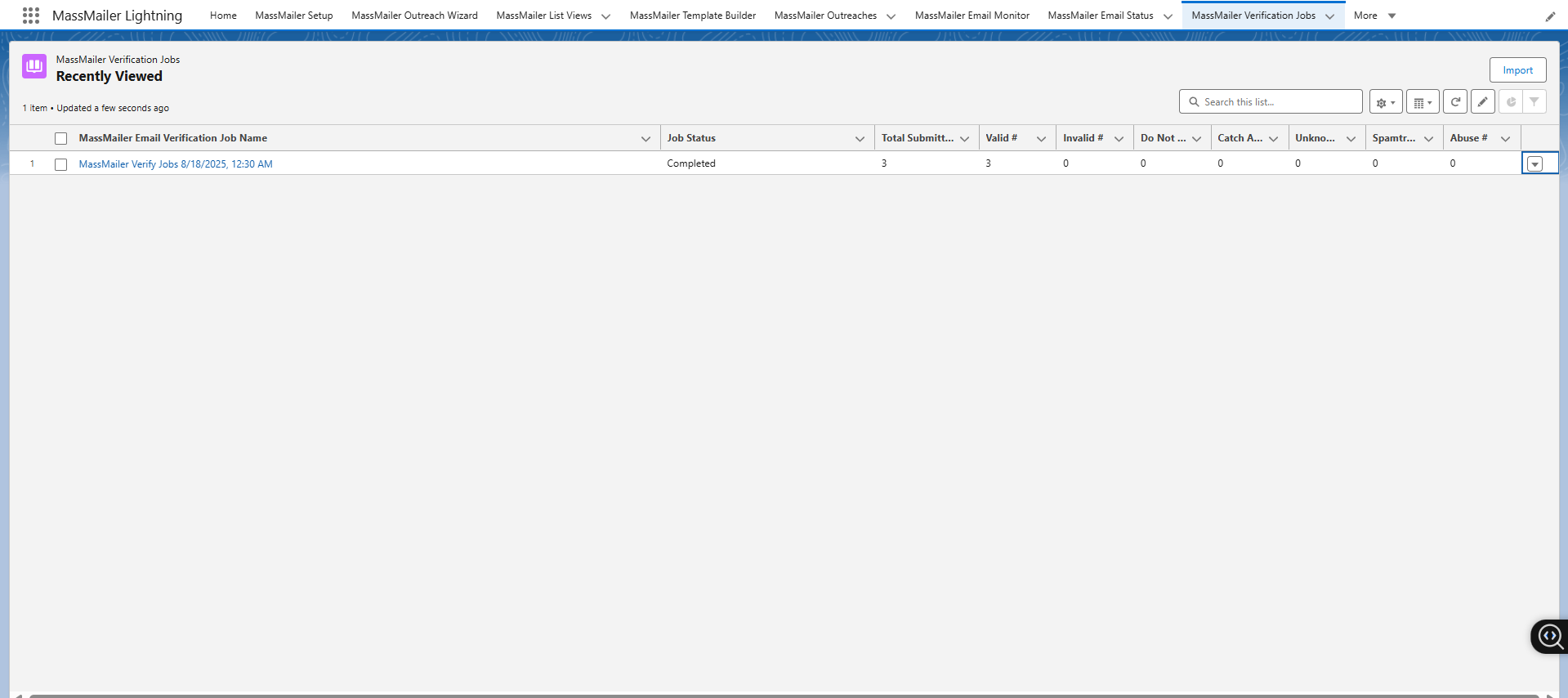
- Email Template Builder: Offers a drag-and-drop interface to create responsive email templates without the need for HTML coding.
- Campaign Management: Facilitates the creation and management of email campaigns, including scheduling, segmentation, and tracking.
- Analytics and Reporting: Provides detailed insights into email performance, including open rates, click-through rates, bounces, and unsubscribes.
- Email Attachments: Allows users to send attachments up to 7MB, including PDFs, documents, and videos, directly from Salesforce.
- Drip Campaigns: Supports the creation of automated email sequences using Salesforce Process Builder.
- Email Alerts: Enables sending and tracking of email alerts through Salesforce workflows.
Pros
- Seamless Salesforce Integration: Being a native Salesforce app, MassMailer integrates smoothly with existing Salesforce data and workflows.
- Enhanced Deliverability: Features like email verification and dedicated IP addresses improve email deliverability and sender reputation.
- User-Friendly Interface: The intuitive email template builder and campaign management tools simplify the email marketing process.
- Comprehensive Analytics: Provides actionable insights into email campaign performance, aiding in data-driven decision-making.
Cons
- Salesforce Dependency: Requires a Salesforce CRM subscription, which may not be suitable for organizations not using Salesforce.
- Learning Curve: Users unfamiliar with Salesforce may face a learning curve in navigating the platform and utilizing MassMailer effectively.
- Pricing: While competitive, the cost may be a consideration for small businesses or startups.
Pricing
MassMailer pricing starts at $219/month for 10,000 emails with a dedicated IP, with discounts available for annual billing, non-profits, and educational institutions. Plans scale by volume and can be customized with add-ons as your needs grow.
Ratings
Adobe Marketing Cloud
Marketo Engage is a comprehensive marketing automation platform tailored for B2B organizations. Acquired by Adobe in 2018, it integrates seamlessly with Adobe's suite, offering advanced tools for lead management, campaign automation, and account-based marketing.
Key Features
- Lead scoring and nurturing
- Multi-channel campaign orchestration
- Advanced analytics and reporting
- AI-driven personalization
- Robust integrations with CRM systems
Pros
- Scalable for enterprise needs
- Deep integration with Adobe products
- Comprehensive analytics capabilities
Cons
- Steep learning curve
- Complex pricing structure
- Limited native integrations outside Adobe ecosystem
Pricing
Marketo Engage does not publicly disclose its pricing. Instead, it offers customized pricing based on the number of contacts, selected modules, and the complexity of implementation.
Ratings
Oracle Marketing Cloud
Oracle Marketing Cloud, primarily known through its Eloqua platform, offers enterprise-grade marketing automation solutions. It provides tools for lead management, campaign orchestration, and analytics, catering to large organizations with complex marketing needs.
Key Features
- Advanced lead scoring and nurturing
- Multi-channel campaign management
- Comprehensive analytics and reporting
- Integration with Oracle and third-party CRM systems
- AI-driven insights and personalization
Pros
- Robust features for large enterprises
- Seamless integration with Oracle products
- Strong analytics capabilities
Cons
- Complex user interface requiring training
- Higher cost compared to some competitors
- Integration with non-Oracle systems can be challenging
Pricing
Oracle Marketing Cloud does not publicly disclose its pricing. Instead, it offers customized pricing based on the number of contacts, selected modules, and the complexity of implementation.
Ratings
HubSpot Marketing Hub
HubSpot Marketing Hub is a comprehensive inbound marketing platform designed to help businesses attract, engage, and delight customers. It offers a wide range of tools for content management, lead nurturing, and analytics.
Key Features
- Email marketing and automation
- Landing page and form builders
- CRM integration
- SEO and content strategy tools
- Comprehensive reporting and analytics
Pros
- User-friendly interface
- Strong CRM integration
- Extensive educational resources and support
Cons
- Higher pricing tiers can be costly
- Limited customization options in lower plans
- Some advanced features require higher-tier plans
Pricing
- Starter: Starts at $15/month for up to 1,000 contacts.
- Professional: Begins at $890/month for 2,000 contacts.
- Enterprise: Starts at $3,600/month for 10,000 contacts.
Add-ons: HubSpot offers various add-ons, such as increased workflows, custom objects, and additional users, each available at additional monthly costs.
Ratings
Zoho Marketing Plus
Zoho Marketing Plus is an integrated marketing automation platform that combines email marketing, social media management, and analytics into a single solution. It's designed for small to medium-sized businesses looking for an affordable and comprehensive marketing tool.
Key Features
- Email marketing and automation
- Social media management
- Analytics and reporting
- Lead management and CRM integration
- Customizable workflows
Pros
- Affordable pricing
- User-friendly interface
- Strong integration with other Zoho products
Cons
- Limited advanced features compared to competitors
- Some users report a learning curve
- Integration with third-party tools can be challenging
Pricing
Zoho offers a free trial for potential users to explore the platform. Starts at $14/month (billed annually) or $19/month (billed monthly).
Add-ons: Additional features like advanced analytics, AI-powered lead scoring, and predictive analytics are available at extra costs.
Ratings
ActiveCampaign
ActiveCampaign is an all-in-one email marketing and automation platform designed for businesses of all sizes. It combines email marketing, automation, sales automation, and CRM functionalities into a single platform.
Key Features
- Visual email automation builder
- Advanced segmentation and personalization
- CRM and sales automation tools
- SMS and messaging integrations
- Comprehensive reporting and analytics
Pros
- User-friendly interface
- High email deliverability rates
- Affordable pricing tiers
Cons
- Limited advanced customization options
- Occasional integration challenges with third-party tools
Pricing
- Free Trial: ActiveCampaign offers a 14-day free trial for potential users to explore the platform.
- Starter: Starts at $15/month for up to 1,000 contacts.
- Plus: Begins at $49/month for 1,000 contacts.
- Pro: Starts at $79/month for 1,000 contacts.
- Enterprise: Pricing starts at $145/month for 1,000 contacts.
Add-ons: Options like SMS marketing, custom reporting, and transactional emails are available at additional costs.
Ratings
What is Salesforce Marketing Cloud?
Salesforce Marketing Cloud is a marketing automation platform that helps businesses manage and automate marketing campaigns across email, social media, mobile, and web. It offers tools for customer journey mapping, audience segmentation, personalized messaging, and analytics.
Salesforce Marketing Cloud integrates with Salesforce CRM to deliver targeted, data-driven campaigns. Companies use Salesforce Marketing Cloud to improve customer engagement, increase conversions, and track marketing performance across multiple channels.
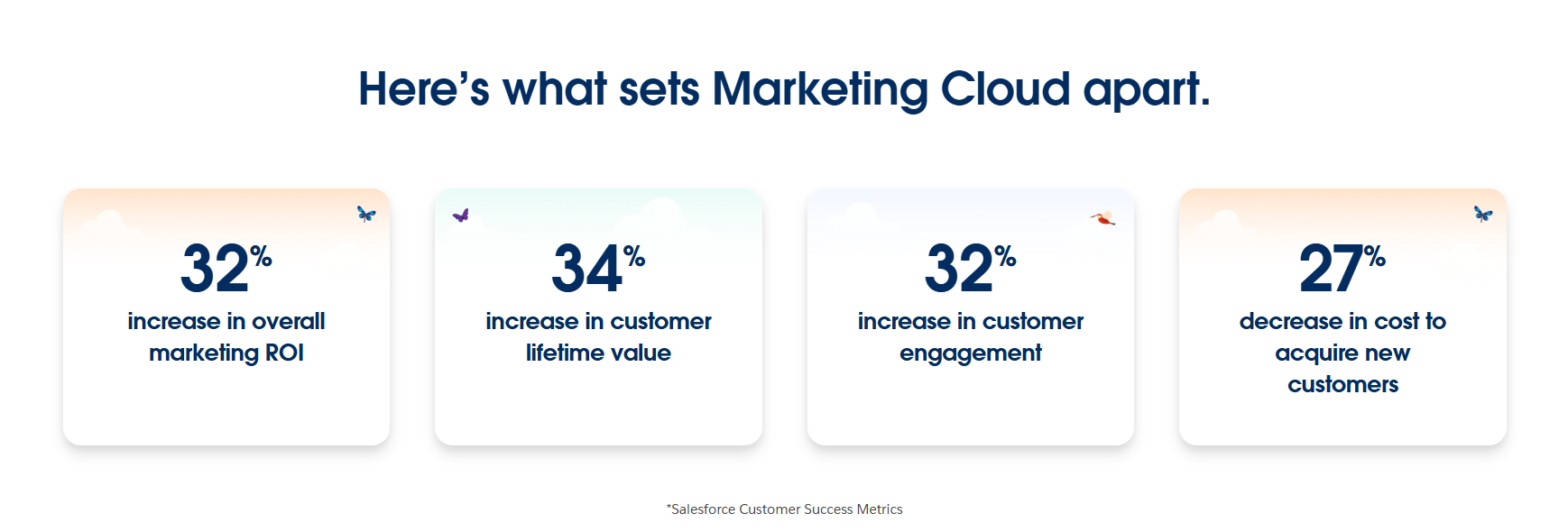
Salesforce Marketing Cloud Customer Success Metrics
Why Do Companies Use Salesforce Marketing Cloud?
Formerly known as ExactTarget, the Salesforce Marketing Cloud email solution is designed primarily to help you seamlessly execute automated and promotional campaigns, personalized emails, behavior-triggered messages, transactional messages, and more.
- A robust email platform, SFMC allows you to send everything from mass or batch email communications to highly personalized as well as event-triggered emails.
- Features a flexible data model that leverages data from any source and automatically imports and exports it.
- Excellent infrastructure and a completely scalable platform trusted by some of the world’s leading brands.
- Specifically designed for marketers, easy to interface with intuitive drag-and-drop tools.
- Features native CRM Integration and connects seamlessly to Sales Cloud, Service Cloud, and more to bypass the email limitations put by Salesforce.
Overall, Salesforce Marketing Cloud is a great email marketing solution for enterprise-sized sales teams looking to improve their email marketing strategies. It offers excellent email personalization abilities to maintain seamless relationships between your customers and a large sales team.
MassMailer vs Salesforce Marketing Cloud
Here is a summary of the comparison between MassMailer and Salesforce Marketing Cloud:
| Aspect | MassMailer | Salesforce Marketing Cloud |
|---|---|---|
| What is it? | MassMailer is a native email solution for Salesforce CRM that enables customers to send unlimited emails, email alerts, drip campaigns, verify mailing lists, build email templates, and more | Salesforce Marketing Cloud is a leading marketing solution that helps increase engagement with every consumer |
| Ideal for | Salesforce CRM customers and other email marketing service providers globally | Companies of all sizes, in all industries |
| Pricing |
|
|
| Main features |
|
|
Salesforce Marketing Cloud Limitations
Salesforce Marketing Cloud (SFMC) is a robust platform for marketing automation and customer engagement. But it doesn’t come without its limitations. Here are a few key limitations of Salesforce Marketing Cloud and how they can impact your business.
1. High Cost
Salesforce structures its pricing based on a tiered model, where businesses pay for access to a variety of tools, such as email marketing, automation, data management, and analytics. While this pricing model works well for large enterprises with significant budgets, it can be a financial burden for small businesses or startups that don’t have the same level of resources.
For smaller businesses, the cost can be prohibitive, especially when they need only a subset of the features offered by Salesforce. Companies that don’t require the full range of tools might end up paying for features they don’t use, making it less cost-effective.
In fact, users mention that Salesforce’s pricing model can be a real headache for small businesses. One user points out that while $25 per user per month might seem like a steal, that’s just for the most basic version, which doesn’t offer much. To get the features businesses actually need, they often end up paying anywhere between $75 to $100 per user per month.
For companies that don’t need the full suite, it’s easy to end up paying for extras they don’t use. It’s a classic example of “you get what you pay for,” but for small businesses, the price might simply not be worth the investment.
2. Complex Interface
Marketing Cloud’s user interface can be overwhelming for users who are new to Salesforce or marketing automation in general. The complexity of the system, coupled with the vast array of customization options, means that users need to invest considerable time and effort to familiarize themselves with the platform.
While the platform is powerful, many find it a tough nut to crack. One user complains about the UI saying that it is "not intuitive at all," adding that it's a real pain if you're just starting out. Another comment points out that it’s more suitable for large enterprises with dedicated teams, as its deep learning curve can be a major hurdle for smaller businesses.
It’s not just about getting used to the platform but users often feel lost navigating through the many tools, dashboards, and settings. One user shares that they spent months trying to get comfortable with it, only to realize the complexity is simply part of the package.
3. Technical Limitations
Salesforce Marketing Cloud also has certain technical limitations that can hinder its performance. One key issue is the integration with third-party applications. Although Salesforce offers extensive integration capabilities, connecting the Salesforce Marketing Cloud with other tools, such as third-party e-commerce platforms or niche marketing tools, can sometimes require custom development work.
This level of customization can be both time-consuming and costly, especially for businesses without a dedicated IT team.
Managing large datasets within the platform can lead to slower performance and may require ongoing optimization efforts. This is particularly challenging for businesses that rely on real-time data processing and analytics, as delays can impact decision-making and campaign execution.
Salesforce Marketing Cloud’s technical limitations can certainly create roadblocks for users. One user shared their frustration with the platform’s frequent glitches, like hanging pages and mysterious errors when performing simple tasks, such as adding attributes to a data extension.
They also pointed out issues with syncing data, particularly with Salesforce objects, where even small changes would require complex workarounds, like resyncing objects or creating new fields. This makes something that should be straightforward feel unnecessarily complicated.
Understanding these limitations can help businesses make an informed decision about whether Salesforce Marketing Cloud is the right fit for your needs or if a competitor would offer better value and ease of use.
How to Choose the Right Alternative
When choosing the right alternative to Salesforce Marketing Cloud, it’s essential to carefully evaluate several key factors to ensure that the new platform aligns with your unique business needs.
1. Assess Your Needs
Clearly identify your specific marketing goals. This is a crucial first step.
For example, are you primarily focused on automating email campaigns, or is CRM integration your main priority? If you need deep analytics capabilities, make sure the platform offers robust reporting tools.
For instance, if your business is heavily focused on customer segmentation and behavioral tracking, you might need a solution that provides advanced personalization features and predictive analytics.
A good way to assess your needs is by considering the following:
- Email Marketing: Do you require advanced features like dynamic content and A/B testing, or is simple automation sufficient?
- CRM Integration: Are you already using a CRM like Salesforce and need deep integration, or is CRM management secondary to your operations?
- Lead Nurturing: Are you focusing on lead scoring and nurturing prospects through detailed workflows?
By identifying these key requirements early on, you’ll narrow down the pool of potential alternatives to platforms that are better suited for your business objectives.
2. Evaluate Features & Pricing
Once you have a clear understanding of your needs, it’s time to dive deep into comparing platform features and pricing. It’s tempting to opt for the solution with the most features, but this can lead to unnecessary complexity and inflated costs.
Look for platforms that offer just the features you need. You want a platform that can deliver the necessary functionality without the overhead of tools you won’t use.
Consider these aspects during the evaluation:
- Customization and Scalability: Does the platform offer customization options to meet your business’s growth?
- Pricing Models: Ensure the platform’s pricing structure is transparent and scalable
3. Consider Support and Integrations
Support and integrations are often overlooked in the selection process but can be a significant factor in determining your success with the platform. Choose a platform that integrates seamlessly with your existing tools, whether it’s your CRM, e-commerce platform, or social media channels. The less time you spend on integrating systems and troubleshooting issues, the more time you’ll have to focus on executing successful campaigns.
When evaluating support, consider:
- Customer Service Channels: Does the platform offer 24/7 support, live chat, or phone support? How quickly do they resolve issues?
- Documentation and Training: Salesforce’s vast platform can be overwhelming without sufficient training. Look for alternatives that offer robust onboarding resources and certifications.
Choosing the right alternative to Salesforce Marketing Cloud ultimately comes down to understanding your unique needs and matching them with the best features, pricing, and support.
By carefully considering these three core factors, you’ll be able to select the platform that provides the most value for your business. Remember, the right platform should not only support your current marketing goals but also scale with your business as it grows.
Conclusion
Choosing the right marketing automation platform can be a pivotal decision for your business. Salesforce Marketing Cloud is a robust and feature-rich solution that works exceptionally well for larger enterprises with extensive marketing needs.
But its high cost, complex interface, and technical limitations can make it less appealing for smaller businesses or teams with limited resources.
The key to finding the right fit lies in understanding your specific business needs, whether that’s deep CRM integration, cross-channel automation, or advanced analytics, and matching those with the capabilities of the platform.
It’s also worth noting that marketing automation isn’t just an expense. It’s an investment. In fact, according to Nuclear Research, for every $1 spent on marketing automation, companies see an average ROI of $5.44 over three years, proving that the right platform can pay for itself many times over.
Ultimately, the right platform should not only solve your immediate challenges but also provide scalability as your business grows. Take the time to evaluate pricing, features, and support to ensure you’re making an investment that will deliver value now and in the future.
If you are looking for a robust email solution for Salesforce CRM, MassMailer is an excellent choice. The platform enables you to send unlimited emails and email alerts, verify mailing lists, create drip campaigns, build email templates, and more using the Salesforce-friendly interface.
To know more about MassMailer, start your free trial today.
Frequently Asked Questions
What factors should you consider when choosing a Salesforce Marketing Cloud alternative?
Is MassMailer a good alternative to Salesforce Marketing Cloud?
How does MassMailer integrate with Salesforce?
What pricing options are available for MassMailer?
Can I try MassMailer before committing to a subscription?
Is MassMailer suitable for small businesses?
Start Your Free Trial Today
Experience MassMailer the easiest way to send personalized emails from Salesforce.
Related Blogs
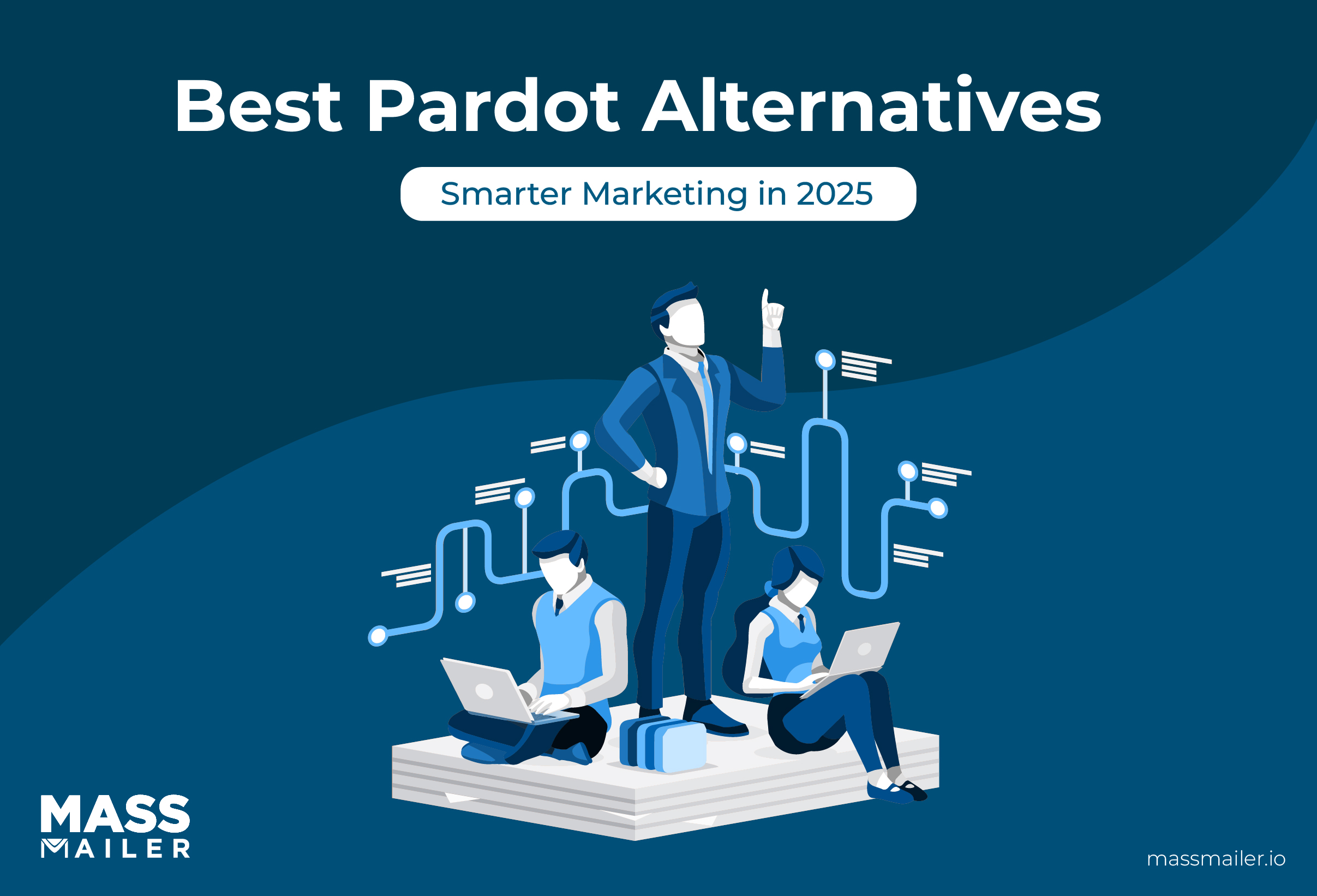
Best Pardot Alternatives for Smarter Marketing in 2025
MassMailer Resources
MassMailer Glossary

